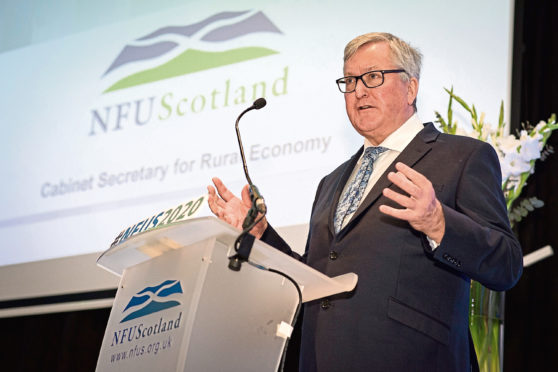New funds worth £40 million are being made available from this year to help Scottish farmers tackle climate change.
Rural Economy Secretary Fergus Ewing unveiled the Scottish Government’s Agricultural Transformation Programme (ATP) to NFU Scotland’s (NFUS) conference in Glasgow yesterday and said it was focused on improving the environmental sustainability of the sector.
The details of schemes are still to be developed, but it is envisaged the money will be apportioned as £20m of capital, to be paid to farmers as grants, and £20m in the form of loans.
Mr Ewing outlined what he called “key areas of opportunity” for the industry which include funding pilot schemes to reduce greenhouse gas emissions; encouraging more tree planting; promoting the benefits of good grassland management for livestock producers; investment in renewable energy; and the development of organic farming.
He said: “I think farmers are ready, they’re up for this, provided it is practical and doable.
“We want to give them notice because in March they will receive the first tranche of convergence payment which will be an opportunity to invest in the future of sustainable farming.”
The announcement came just hours after NFUS president Andrew McCornick argued the farming industry was being asked to respond to a climate change emergency without being given the tools.
Mr Ewing said: “I understand the concerns over practicality and deliverability, so we will work closely with farmers to ensure this is a practical, effective and deliverable scheme.”
Mr Ewing also suggested the enhancement of environmental credentials in Scottish agriculture and the production of “low carbon food” could result in financial benefits.
“Low carbon-sourced food will in time become a benefit for farmers because it will produce a market premium compared to food that hasn’t been produced to high environmental standards,” he said.
“By sending this message now we help to allay some of the critics of farming which are causing the industry concern.”
He also made it clear the new programme was signalling the direction of travel of future support schemes and there would be more environmental schemes in future.
However he insisted climate change measures did not require the cessation of livestock farming in Scotland
He said: “Mixed livestock grazing sustains permanent grassland and that’s great for biodiversity. If it were not for that we’d see the landscape we take for granted replaced by one made up of bracken, thistles, weeds and looking unkempt and unattractive.”
NFUS said it was “already engaged” with climate change and would work closely with Scottish Government in the design and implementation of new measures.
nnicolson@thecourier.co.uk










